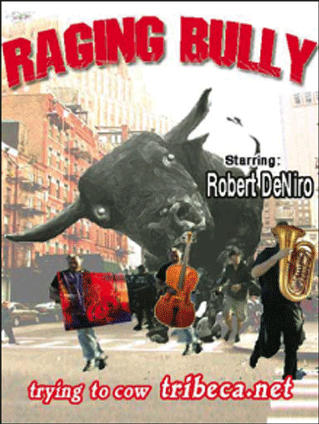By Skye H. McFarlane
Volume 19 Issue 39 | February 9 -15, 2007
‘
Tribeca: The term coined to describe the triangle-shaped neighborhood below Canal St. has morphed in recent years, becoming a veritable brand name to signify all that is hip, artsy and quintessentially New York. The name has been slapped on a Subaru S.U.V. model and a line of high-end Lenox dinnerware sold by Bed Bath & Beyond.
But if Robert DeNiro gets his way in a federal lawsuit filed Jan. 29, the name Tribeca (at least where entertainment is concerned) will mean only one thing — the Tribeca Film Festival.
The Film Fest and its associated companies have filed suit against the grassroots Web site Tribeca.net and its founder, Chuck Harris, a 34-year resident of the neighborhood. The suit claims that Harris’ cyberspace-based arts organization, Tribeca Network, infringes on the Film Festival’s intellectual property rights because it uses the name Tribeca — a component of several Film Festival trademarks — in conjunction with “entertainment related goods and services.”
Those goods and services include a series of free “channels” where users can post videos, art and writing; a Web-based radio station called Radio Free Tribeca; and a virtual store that offers a smattering of Tribeca Network merchandise. DeNiro’s lawyers have demanded that Harris turn over his domain names to the Film Festival and provide an accounting of all his site’s revenues.
“From their lips to god’s ears,” Harris said of the demand for revenue documents. “We have yet to bring in our first penny. We haven’t even sold a t-shirt.”
Similar threats from the Film Festival forced another local organization, the Tribeca Underground Film Festival, to abandon its Internet domain and change its name to the Be Film Festival. Harris, however, has hired lawyers and plans to fight the suit for as long as he is financially able. He has also taken the battle to the court of public opinion, giving interviews with newspapers and posting an angry rebuttal letter on his site along with a mock movie poster entitled “Raging Bully.” A giant black bull in the poster, representing DeNiro, chases helpless filmmakers and musicians through the streets of Tribeca.
Though DeNiro’s spokespeople could not be reached for comment, Film Festival lawyers told Harris in a Dec. 22 letter that his sites, particularly the domain tribecashorts.net, were trading on the Film Festival’s popularity and confusing the Web-surfing public.
“Moviegoers, sponsors, fans from around the world and other consumers are likely to be confused into thinking that our clients are affiliated with, sponsor, endorse or are otherwise associated with you and your infringing Web sites,” the letter said, signed by Jean Voutsinas of the law firm Frankfurt, Kurnit, Klein & Selz.
Harris calls the claims of confusion ridiculous. In an Internet search for terms such as “Tribeca film” or “Tribeca shorts,” the Film Festival site appears immediately, while the Tribeca Network site shows up only after clicking through several pages of links. The Network site itself has a basic template, colored in muted green and yellow. The Tribeca Film Festival sites, by contrast, are splashed with bright colors, Flash applications and a signature logo in which the words Tribeca, Film and Festival are stacked vertically, sharing a single “I.”
To confuse the sites, “you’d have to be pretty drunk,” Harris said, adding that aside from hosting an open-mike comedy night at a local bar, Tribeca Network exists only in cyberspace. “If people wanted to walk into our screening room, they’d have some real trouble.”
As for Tribeca Shorts, the site’s repository for brief video clips, Harris said that he would happily have changed the name if the Film Festival had only asked nicely.
“If that really offended them, all they had to do was give us a call or send us an email,” he said.
Harris said that if the festival reps are willing to compromise, he would still be willing to drop the “Tribeca Shorts” name or write a disclaimer on his site to say that it is not affiliated with the festival. As it is, Harris’ site never uses the term “film” or “film festival.” However, the lawsuit’s broad language has Harris worried that DeNiro, who no longer lives in Tribeca, is trying to assert ownership over the name Tribeca in association with not just film, but any kind of arts or entertainment. If this case were to establish such a precedent, he said, other neighborhood businesses could be in trouble.
“There’s the Tribeca Performing Arts Center down at the college. I guess they’d be next on the list,” Harris said, agreeing that TribecaRadio.net, which broadcasts a news report by Downtown Express, could also face litigation down the line. “I just don’t know where they’re likely to stop.”
Harris plans to defend his site on the grounds that the Tribeca name has historically been associated with an independent artistic community, as well as the fact that he has owned the Tribeca.net domain name since 1995. He used the site to promote live entertainment at the No Moore Club, among other things, before turning it into a media-sharing service in 2005. The Tribeca Film Festival began in 2002. If the festival offered to buy out Tribeca.Net, though, Harris says that he’d consider selling the business and using the money to build an arts center.
“All I want to do is see the arts community continue to flourish in Tribeca,” Harris said. “[DeNiro and the Film Festival] need to support the history of arts in the neighborhood.”
Skye@DowntownExpress.com




































